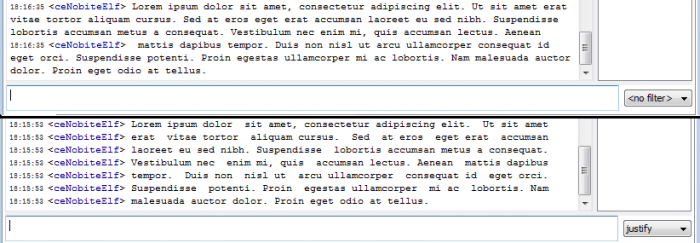From EncyclopAtys
CeNobiteElf (talk | contribs) m (moved CeB to Client en Bois over redirect) |
(Added info how to connect via telnet) |
||
| Line 106: | Line 106: | ||
<big>'''*'''</big> Requires Qt4.5, that you compile it yourself and additional configuration to get to Ryzom Support Chat. | <big>'''*'''</big> Requires Qt4.5, that you compile it yourself and additional configuration to get to Ryzom Support Chat. | ||
| + | |||
| + | = Alternative = | ||
| + | |||
| + | If you don't want to use the official client, you can also access the same support via 'telnet', using the server <code>chat.ryzom.com</code> over the port <code>6001</code>. | ||
| + | |||
| + | e.g. from the command line in GNU/Linux (and similar OS): | ||
| + | <code>telnet chat.ryzom.com 6001</code> | ||
= See also = | = See also = | ||
Revision as of 19:34, 14 August 2011
CeB or Client en Bois is a <Mtp> chat client written using C++ and Qt4. It ultimately replaced Klients as the interface for accessing the support chat for Ryzom.
Contents
Development
Features
Below is a list of the main features:
- Support of Ryzom chat support servers
- Multi-servers managing
- Multilingual
- Tabs for tell, wall, who, etc
- Support of Lua scripting
- Search feature
- Logs
- Nicknames completion
- Auto-connections
- "About me" popups (Warningo)
- Tray icon (with activity warning)
- Auto-away and auto-leave
- Keep-Alive
Access from within Ryzom
Chat commands
There are a wide variety of chat commands available
Filters
This feature of CeB makes it possible to apply a "filter" to what you type. Only certain things can go through the filter and this will have a certain output, depending on the filter applied naturally. Those familiar with Lua should have no problem making use of filters.
At present the alternate, haxor, insult and rot13 filters are not included in the latest stable build of CeB for Windows. To make use of these filters simply download and copy the required files into the "scripts" folder, located in the CeB directory. The archived files for the filters can be downloaded here for .rar and here for .zip.
alternate
This filter changes the input string so that in the output string every odd numbered letter is lowercase and every even numbered letter is uppercase.
Plain: Once upon a time there lived a ploderos which made strange sounds... alternate: oNcE UpOn a tImE ThErE LiVeD A PlOdErOs wHiCh mAdE StRaNgE SoUnDs...
calc
This filter allows one to do calculations in CeB as well as use certain special os functions. Basic calculations as well as many more complex ones can be done with this filter applied, it should be noted though that this filter makes heavy use of Lua math library for more complex calculations.
Below is a list of more commonly used functions and operators, for a full list of Lua math functions see the Lua Math Library and for a full list of Lua os functions see the Lua Os Library.
Operators
- + for addition
- – for subtraction
- * for multiplication
- / for division
- ^ for exponents (eg. 5^3 ≡ 53)
Trigonometry
- math.sin(<operand>) Outputs the sine value of the operand
- math.cos(<operand>) Outputs the cosine value of the operand
- math.tan(<operand>) Outputs the tangent value of the operand
Note: The output of these functions are in radians, to convert it to degrees make use of math.deg(<operand>)
Os
- os.clock() Returns CPU time since Lua started
- os.exit() Terminates the host program
- os.getenv("<variable>") Returns the value of the process environment variable <variable>, or nil if the variable is not defined
- os.time() Displays time in system seconds
Other
- math.pi Outputs the value of π
- math.random() Outputs a random value between zero and one
- math.random(<parameter>) Outputs a random value between zero and the given parameter
- math.random(<parameter>,<parameter>) Outputs a random value between the first parameter and the second parameter
- math.floor(<operand>) Rounds the value of operand down to the nearest integer
- math.ceil(<operand>) Rounds the value of operand up to the nearest integer
code
This filter preserves formatting and whitespace. It is most commonly used to display code in chat.
haxor
This filter replaces the input string with different kinds of alphanumeric characters, giving the output string an appearance similar to that of leetspeak. Currently this filter only converts lowercase characters.
Plain: abcdefghijklmnopqrstuvwxyz haxor: @BCD3fGH1JKLmn0pqrSTuvWXy2
insult
This filter searches for the substring, "*insult*", in the input string and in *insult*'s place outputs a random French insult. The insult consists of two parts, an adjective and a noun.
Possible adjectives are pauvre, misérable, lamentable, triple, sombre, abominable and effroyable.
Possible nouns are con, abruti, débile, connard, merde, naze, déchet, tête de noeud, bâtard, enxulé, idiot and crétin.
justify
This filter takes the input string and formats it into a justified typesetting.
rot13
rot13 is short for rotation 13. This filter encodes all you type with a Caesar Cipher with a left rotation of thirteen:
Plain: ABCDEFGHIJKLMNOPQRSTUVWXYZ rot13: NOPQRSTUVWXYZABCDEFGHIJKLM
rot13 only affects letters of the basic Latin alphabet, it does not affect numbers, special characters and other alphabets, such as æ, å, č, é, ê, ħ, ï, µ, ñ, ø, ō, ß, þ, ù, ÿ, etc.
Downloads
- CeB for Debian and Ubuntu 32 bit*
- CeB for Windows 32 bit
- CeB for Debian and Ubuntu 64 bit*
- CeB for Windows 64 bit
- Additional Filters (rar)
- Additional Filters (zip)
* Requires Qt4.5, that you compile it yourself and additional configuration to get to Ryzom Support Chat.
Alternative
If you don't want to use the official client, you can also access the same support via 'telnet', using the server chat.ryzom.com over the port 6001.
e.g. from the command line in GNU/Linux (and similar OS):
telnet chat.ryzom.com 6001




